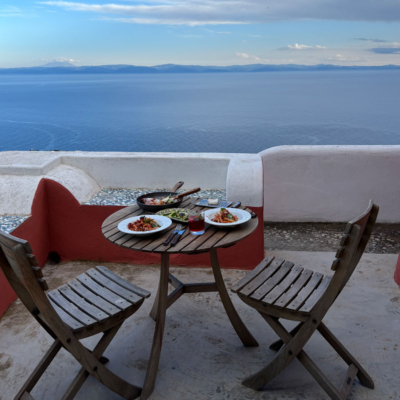Within THE GLOSS Magazine’s #MindOurselves campaign, we are advocating for more awareness around stress, anxiety, fear and mental health and how we can mind both ourselves and others. Yet every week, as I put together this column, I am consumed by one question: how can I talk of minding myself or anyone else without talking about minding our precious earth? In the same way that Greta Thunberg dismisses school when her future is at stake, I find it difficult to focus on my own wellbeing when the wellbeing of our fundamental life source is at risk. As the world strikes for climate this Friday, it is clear that the only way we can truly mind ourselves is by minding and being more mindful of the world around us.
Except, what can we feasibly do? Greta tells us she wants us to panic, to act like our house is on fire. Lord knows, I’m panicking. Battered by the overwhelming proof that life as we know it is on the brink of irrevocable and potentially cataclysmic change, my internal monologue is an opera of hopelessness, powerlessness, and helplessness that creates a binary reaction to Greta’s words: paralysis.
I don’t think I’m alone in my climate anxiety – this feeling of being adrift in an ocean of desperation and confusion. It is not just a climate emergency we’re facing, we’re grappling with an existential emergency too. What to do when we’ve switched to reusable water bottles, run past the meat and cheese aisle with gritted teeth, and unsubscribed from the Ryanair sale emails beckoning from our inbox?
I think I have an answer that protects the planet, its people, and our mental health. While it might sound implausible, one solution to climate anxiety is a special kind of carbon offsetting.
Carbon offsetting is, essentially, the neutralising of carbon emissions – created by the burning of fossil fuels – by preventing the equivalent amount from being emitted somewhere else. It is a balancing act that counterbalances the pollution created by individuals and industries to protect the planet from further global warming.
While it is true that neutralising emissions is no longer enough and we must instead stop creating them altogether, it is also true that this transition is a terrifying one that requires us to excavate the very foundations our personal and professional lives are built upon. From the air miles of the food we eat, to the manufacturing of the clothes we buy, to how we spend our leisure time, we exist in empires built on the burning of fossil fuels. To overhaul each aspect of our life to extricate ourselves from the smog is a daunting and frankly petrifying task and one that requires energy, time, sacrifice, and even money – commodities most of us have already mortgaged to the hilt.
If I’m not fretting over global warming, I’m tormented by the havoc it is wreaking on humankind.
The mere prospect of it is enough to cause a spiral of climate anxiety that ends in inaction. This is where carbon offsetting offers a solution, bridging the gap between wherever we are on our journey towards sustainability and the Utopian ideal of where we need to be. As climate anxiety is characterised by the gnawing feeling that no matter what we do it will never be enough, carbon offsetting is a simple and practical something that counteracts this helpless passivity. It is a life raft of pragmatic action that not only neutralises our impact on the planet but also the guilt and shame this impact inevitably evokes. It is part of our journey towards creating a healthier planet – and a vehicle that helps make that journey bearable.
If I’m not fretting over global warming, I’m tormented by the havoc it is wreaking on humankind. The bitter reality of the climate emergency is that it is a crisis caused by few but felt by many. For us here in Ireland, climate change is an atypically hot summer or the inconvenience of Storm Emma. For communities across Africa, Asia, North and South America, it is a threat to their very survival. Crippled by my own inability to help, social impact carbon offsetting provides a welcome antidote. This is a kind of carbon offsetting that saves carbon from being created in a way that delivers life-transforming change to those most affected by climate breakdown.
I work for an NGO that specialises in this impactful means of offsetting and have witnessed the positive impacts it can have on communities. Through repairing water pumps or providing fuel-efficient stoves, these initiatives reduce deforestation and the amount of carbon entering the atmosphere. However, they also hold a plethora of health, economic, and social benefits. Cases of waterborne diseases decrease, indoor air pollution and resulting illnesses diminish, less time and money spent collecting firewood means children spend more time in education and women – the drivers of change and yet the ones typically left with the burden of poverty – have the capacity to make a living.
Thus, carbon offsetting imbues us with a power to affect far-reaching change that transcends simply subduing our guilt. It answers the main causes of our climate anxiety and soothes the existential dread and overpowering anxiety that follows us onto planes and keeps us company on morning commutes.
Because while Greta is right – our house is on fire and we must start acting like it – panic is not a solution if it leads to paralysis. Unlike Greta, I don’t want you to panic. Our world is panicked enough – already overflowing with reasons not to get out of bed in the morning and too many triggers for heart palpitations and hyperventilation. Rather, I want you to act. Every day. I want you to feel empowered and inspired in the decisions you make. In the helplessness, the hopelessness, the powerlessness, I want you to remember that you have the capacity for change and the potential to make a difference. I want you to remember that this is a journey and the only way forward is to keep moving. But, while we’re getting there, before we go cold turkey on budget airlines or bite the electric car bullet, let’s do what we can to mind our planet, its people and our own wellbeing. After all, as Greta daily reminds us, nobody is too small to make a difference.
Holly Hughes is Vita’s Communications Officer. Vita is an NGO working to deliver climate justice in East Africa. Find out more about Vita or measure your footprint on their carbon calculator here.
The Global Climate Strike takes place this Friday, September 20. In Dublin, the protest will start at the Customs House at 12pm and march to Merrion Square at 12.30pm for a rally outside Government Buildings. To find the strike closest to you visit www.globalclimatestrike.net.
LOVETHEGLOSS.IE?
Sign up to our MAILING LIST now for a roundup of the latest fashion, beauty, interiors and entertaining news from THE GLOSS MAGAZINE’s daily dispatches.










